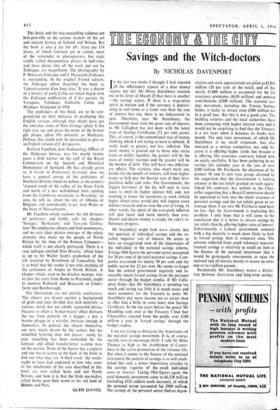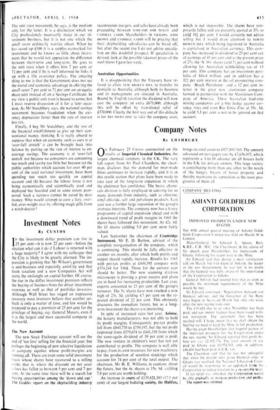ECON0oNp 'ME CM
Savings and the Witch-doctors
By NICHOLAS DAVENPORT
IN the last two weeks I thought I had exposed all the inflationary aspects of a dear money regime, but no! Mr Oliver Stutchbury reminds me in his letter of March 25 that there is another —the savings aspect. If there is a wage-price spiral in motion and if the currency is depreci- ating in real terms at a faster rate than the rate of interest less tax, there is no inducement to save. Therefore, says Mr Stutchbury, the Government must raise the gross rate of interest, as Mr Callaghan has just done with the latest issue of Savings Certificates (7f per cent gross). This, of course, is the conventional way of money thinking which I am trying so hard to debunk. It really leads to greater, not less, inflation. The more money is poured out to those who make loans or prefer liquidity, the greater will be the mass of rentier incomes and the greater will be the burden of debt. This will have two inflation- ary effects. The workers, who won't work any harder for the benefit of rentiers, will want higher wages to help pay the heavier cost of their hire- purchase debts and rents. The Government, the biggest borrower of the lot, will seek to raise taxes to meet its higher interest bill, and, not wanting to lessen the incentives to work (which higher direct taxes would do), will impose more indirect taxation and so raise the cost of living. In other words, the spiral of the cost-push inflation will spin faster and more merrily than ever. Dearer and dearer money is simply the rake's in- flationary progress.
Mr Stutchbury might look more closely into this question of individual savings and the so- called 'negative' rate of interest. He seems to have an exaggerated view of the importance of the individual in the national savings schema. Taking 1964 figures the personal sector accounted for 28 per cent of the total national savings. Com- panies accounted for nearly 50 per cent and the public sector for 22 per cent. He seems to forget that the central government regularly and in- exorably exacts forced savings from the personal sector through the budget surplus. If Mr Calla- ghan thinks that Mr Stutchbury is spending too much and saving too little it is much easier and more economic for the Treasury to make Mr Stutchbury pay more income tax or surtax than to offer him a bribe in some fancy new Savings Certificate. In the ten years before the genial Mr Maudling took over at the Treasury I find that Chancellors exacted from the public over £300 million a year in 'forced savings' through the budget surplus.
I am not trying to denigrate the importance of the national savings movement. It is, of course, socially wise to encourage thrift. I rank Sir Miles Thomas as high as the Archbishop of Canter- bury in the active promotion of the virtuous life. But when it comes to the finance of the national investment the pattern of savings is so well estab- lished that only a minor importance attaches to the savings vagaries of the small individual saver or investor. Taking 1964 figures again, the total domestic investment came to £6,328 million (including £526 million stock increase), of which the personal sector accounted for £980 million. The savings of the personal sector (before depre- ciation and stock appreciation) are gilien as f1,134 1 million (28 per cent of the total), and of this nearly £1,000 million is accounted for by life assurance premiums (£650 million) and pension contributions (f300 million). The national sav- ings movement, including the Trustee Savings banks, is lucky to attract even £300 million net in a good year. But this is not a good year. The building societies and the local authorities have been competing with higher interest rates and it would not be surprising to find that the Treasury is a net loser when it balances its books next month. The unit trust movement, of which Mr Stutchbury is no small ornament, has also emerged as a serious competitor, not only be- cause it is offering higher yields but because it is offering life assurance contracts linked with an equity portfolio. It has been gathering in net savings this calendar year at the rate of over f100 million. Mr Fairbairn, the chairman of the pioneer M and G unit trust group, alarmed by the suggestion that the Government is looking askance at the tax reliefs granted on such equity- linked life contracts, has written to the Chan- cellor suggesting that a Royal Commission should be appointed to look into the whole structure of personal savings and the tax reliefs given to en- courage them. I am sure Mr Fairbairn need have no fear that the Government is neglecting this problem. I only hope that it will come to the conclusion that it is better to attract savings by tax reliefs than by offering higher rates of interest. Unfortunately a Labour government returned with a big majority is much more likely to look to forced savings than to voluntary ones. The amount collected from small voluntary non-con- tractual savings is relatively so small an item in the finance of the national investment that it would be grotesquely uneconomic to raise the national rate of interest merely to secure an extra one or two million pounds.
Incidentally Mr. Stutchbury makes a distinc- tion between short-term and long-term savings.
The unit trust movement, he says, is the medium only for the latter. It is a distinction- which we City professionals necessarily make in our in- vestment business, but it is not one which the small saver ordinarily worries about. When he has saved up £100 it is a surplus earmarked for investment and he knows so little about invest- ment that he would not appreciate the difference between short-term and long-term. He goes to the unit trust when it offers him 7 per cent or 71 per cent and if he is well informed he links it up with a life assurance policy. The amazing thing to me is that the Government does not see the moral and economic advantage in offering the small saver 7 per cent to 71- per cent on an equity share unit instead of on a Savings Certificate. In my view a public unit trust is bound to come, but I must reserve discussion of it for a later occa- sion. As Mr Stutchbury says, the national savings movement becomes fraudulent when the cur- rency depreciates faster than the rate of interest less tax.
Finally, I beg Mr Stutchbury and the rest of the financial establishment to give up their con- ventional money thinking. It is really absurd to suppose that when an economy such as ours is at 'over-full stretch' it can be brought back into balance by putting up the rate of interest to en- courage savings. The economy is at 'over-full stretch' not because we consumers are consuming too much and saving too little but because (a) the public authorities which account for over 40 per cent of the total national investment, have been spending too much too quickly on capital account and (b) because the labour force is not being economically and scientifically used and deployed, but hoarded and to some extent pam- pered. Such -a sickness cannot be cured by dear money. Who would attempt to cure a lazy. over- fed, over-weight man by offering magic pills from a witch-doctor?



































 Previous page
Previous page